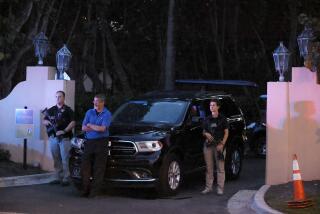NATO Raid Fails to Net Bosnian Serb
- Share via
SARAJEVO, Bosnia-Herzegovina — NATO-led peacekeepers staged a dramatic helicopter raid on two remote mountain villages Thursday but failed to capture Bosnian Serb leader Radovan Karadzic, who is wanted on war crimes charges by a U.N. tribunal.
The raid began when four helicopters landed near the southern Bosnian village of Celebici. Black-masked soldiers stormed out to search houses and other buildings, breaking through locks or doors when necessary, local residents told reporters who later visited the scene.
As they demanded entry to homes, the soldiers distributed leaflets that carried a message in Serbian: “Don’t be afraid. It’s a routine check.” Soldiers also broke into shops, locked apartments and a church, sometimes using explosives or firing bullets into locks.
At least 40 troops from several countries participated. A soldier was reported slightly injured by one of the explosive blasts. Three weapons caches were found during the raid, but there was no resistance and no other injuries were reported.
The raid was the first publicly known effort to arrest Karadzic, who was indicted in 1995 on charges of genocide and other war crimes during the 1992-95 Bosnian war. He has been in hiding since 1996 and now tops the tribunal’s list of most-wanted suspects.
“Karadzic was not found at this location,” NATO said in a statement issued at its headquarters in Brussels. “However, this operation demonstrates SFOR’s capabilities and resolve to act in apprehending, by force if necessary, persons indicted for war crimes.”
Fear of casualties is widely seen as a key reason the peacekeeping force in Bosnia, known as SFOR, has not acted more aggressively to locate and arrest Karadzic.
There has also been speculation that his arrest could trigger anti-Western violence in Serb-dominated areas of Bosnia, where far more people consider him a hero than a criminal. In Celebici, a poster could be seen Thursday with a photograph of Karadzic and the words “Don’t Touch Him.”
Bosnia has a complicated system of elected leadership, but ultimate power rests with an international administration and an about 16,000-member international peacekeeping force set up by the 1995 Dayton accords that ended the war.
Supporters of Karadzic responded to the raid’s failure by virtually taunting SFOR.
One of Karadzic’s brothers, Raco, said Thursday that Karadzic is at “a safe place” and is “healthy and well,” Yugoslavia’s state-run Tanjug news agency reported.
Jovan Zametica, a former key advisor to Karadzic, told Belgrade’s independent Fonet news agency that “SFOR certainly doesn’t know where Radovan Karadzic’s hide-out is, and there is no danger at all for him.”
The aim of Thursday’s raid “was probably to test reaction of the population” to an arrest effort, rather than being a serious attempt to capture Karadzic, Zametica said.
Karadzic and his military commander, Ratko Mladic, were indicted by the tribunal for the siege of Sarajevo and a 1995 massacre of thousands of Muslim men and boys in Srebrenica. They were allies of former Yugoslav President Slobodan Milosevic, who is now on trial at the tribunal in The Hague on charges of genocide and crimes against humanity in Bosnia, Croatia and Kosovo, which is a province of Serbia, Yugoslavia’s main republic.
Karadzic is believed to be hiding in the general area of Thursday’s raid, protected by armed guards. Mladic is thought to be in Serbia.
In an apparent reaction to the arrest attempt, four shots were fired at a building of the United Nations’ International Police Task Force in Bijeljina, in northeastern Republika Srpska, the Serb-dominated part of Bosnia, according to a report by Belgrade’s independent B-92 Radio. There were no other immediate reports of violent reactions.
SFOR reported finding anti-tank rockets, mortar shells, grenades, machine guns and antipersonnel mines in the raid, which also involved searches in the nearby village of Jecmenovo. The raid was conducted based on an anonymous tip, SFOR said.
Bosnian Serb television reported the sounds of gunfire and explosions during the raid. Roads toward Celebici were blocked Thursday morning, and NATO helicopters were seen leaving Mostar airport, about 50 miles from Celebici.
Carla Del Ponte, chief prosecutor for the Hague tribunal, has bitterly criticized the failure of authorities to find and arrest Karadzic and Mladic. In a visit to the region last month, she said it was certain that Karadzic was in the Serbian part of Bosnia.
Bosnian Serb leaders have sought to project a more moderate image in recent months. The party founded by Karadzic, the Serbian Democratic Party, expelled him and all other war crimes suspects in December. But the sincerity of the efforts has been widely questioned.
Reaction to the raid by Bosnian Serb leaders was sharply negative, with several arguing that they should have been informed in advance of the SFOR action, despite the risk that someone might tip off Karadzic.
“It is impermissible that such an operation take place without the knowledge of any institution of Republika Srpska,” said Mladen Ivanic, the Serb entity’s prime minister.
“One cannot expect that institutions of Republika Srpska will cooperate with the Hague tribunal while at the same time there is no cooperation of international institutions with Republika Srpska,” Ivanic said. “That means there is distrust toward us, and then we do not have a single reason to trust the other side.”
*
Special correspondent Zoran Cirjakovic in Sarajevo contributed to this report.
More to Read
Sign up for Essential California
The most important California stories and recommendations in your inbox every morning.
You may occasionally receive promotional content from the Los Angeles Times.













